Sites Like Airbnb: Top Airbnb Competitors and What Sets Them Apart
Last Updated March 2024
With over 7.7 million active listings and over 5 million hosts, it’s safe to say that everyone knows Airbnb is at the top of the vacation rental industry’s throne.
Anyone can find a short-term rental option that fits their travel needs on Airbnb. Whether that be in an urban or rural area, on the beach or in the forest, shared homes or properties all to yourself, Airbnb has got it.
Airbnb was able to capture a wide market share of the vacation rental industry, but they are not the only ones doing well today. In fact, there are many other companies that offer similar services and are even finding enough success to compete with Airbnb.
Who are Airbnb competitors? As a host, it’s always good to get to know what other companies are in the same industry so you can expand your audience and get more bookings. In this guide, we’ll compare Airbnb with some other common listing sites, so let us go over the top Airbnb competitors.
Don’t see the form to download our Airbnb rental agreement? Click here.
Airbnb market share vs. competitors
Since 2010, the market share of Airbnb has risen dramatically and will most likely continue to rise going into the future. They currently operate in 220 different countries across the globe and have over 7.7 million active listings. Needless to say, Airbnb is a truly internationally recognized company.
Airbnb has a giant footprint in the vacation rental industry market share. It’s estimated that Airbnb’s market share is 16.7% of the entire vacation rental market in the U.S., which brings its worth to about $90 billion.
Main Airbnb alternatives
As we all know, Airbnb has some of the best brand recognition of not only vacation rental platforms, but of just about any company. However, there are several other sites like Airbnb who are challenging its reign. Let’s take a look at some of the biggest alternatives to Airbnb to be reckoned with.
Vrbo
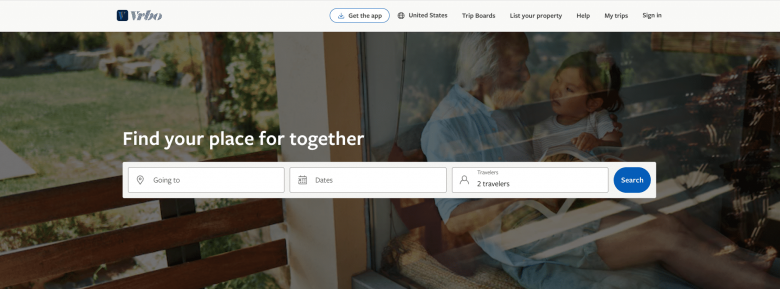
As the biggest Airbnb competitor with over 2 million listings and vacation rentals in 190 countries and counting, Vrbo is the next most important website, following Airbnb, to be familiar with for your vacation rental business.
Vrbo is an acronym that stands for “vacation rentals by owner.” It started out as its own independent company in 1995. Then it was acquired by HomeAway in 2006 and later by the vacation industry giant Expedia Group in 2015.
Being a part of the parent brand the Expedia Group, Vrbo listers get access to the entire Expedia network. Whenever you list your property on Vrbo, it gets automatically listed on Expedia. This grows your visibility from the 42 million unique monthly visitors on Vrbo to the 112+ million monthly unique visitors on Expedia Group.
How do they compare?
Airbnb and Vrbo share a lot of things in common. Similar to Airbnb, Vrbo is a vacation rental platform where homeowners list their properties directly on the website. They both offer unique accommodations that range from beach houses, mountain cabins, treehouses, villas, boats, and more.
Both of them also offer similar features as well. They allow private and commercial homeowners to rent their properties, execute transactions, get a commission from each booking, and offer special distinction to hosts that provide exceptional service.
One of the main differences between Airbnb and Vrbo is that Vrbo only offers entire properties for rent (meaning the whole apartment, house, villa, or condominium). On Vrbo, you will always have the place to yourself, whereas Airbnb offers the option to do house shares. Because of this, Vrbo tends to attract larger and more high-end rental properties. In turn, they cater more to families, groups of friends, and travelers with higher budgets.
Booking.com
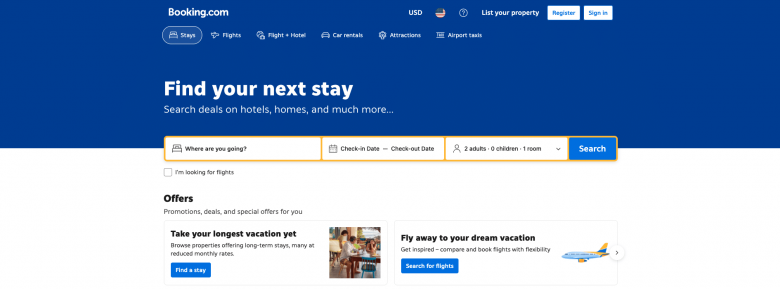
Booking.com was founded in 1996 as a startup in Amsterdam. On top of accommodations, it also offers bookings in flights, rental cars, attractions, airport taxis, and also flight and hotel combination deals. It originally only offered hotel accommodations, but now, it has invested in growing its inventory of vacation rentals.
Booking.com offers more than 28 million accommodation listings, with about 6.6 million of those being homes, apartments, and unique short term rentals. It is available in 228 countries.
In recent times, this online travel agency (OTA) had invested large amounts of money into marketing itself and growing its brand recognition, especially in the United States. That being said, Booking.com is expected to grow and compete for a larger portion of the market share.
How do they compare?
Airbnb and Booking.com have both made a name for themselves in the travel industry. However, their main focuses differ a bit. Airbnb has always been about homeowners being able to list their spare rooms or properties for profit. Booking.com, on the other hand, is still primarily for reserving hotel rooms.
In terms of markets, Airbnb has an edge over Booking.com in the United States, but Booking.com has its stronghold in Europe. It’s estimated that Booking.com has 70% of the market share in Europe.
Also, Booking.com provides services that range in all categories of travel and vacation, such as hotels, flights and car rentals, while Airbnb mostly focuses on vacation rentals. Booking.com is trying to compete in the vacation rental business now with their Homestays option. Only time will tell if they are able to catch up to Airbnb in this category.
Expedia
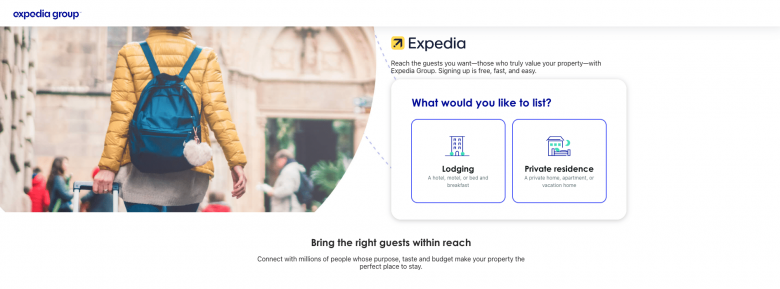
Expedia is an established OTA that offers start to finish vacation services, such as flights, cars, stays, things to do, cruises, and bundle packages.
Generally speaking, Expedia does not come to mind when thinking of vacation rentals. However, they do offer the option of filtering by property type on their webpage and also through their many partners. The Expedia Group owns Expedia, Vrbo, Hotels.com, Hotwire.com, Orbitz, Travelocity, trivago, and CarRentals.com, to name a few.
In total, the Expedia Group has about 3 million available lodgings, with 2 million of those being alternative accommodations and 875,000 being hotels. The group also owns over 200 travel industry websites that are present in more than 70 countries. They get about 86 million monthly unique visitors.
Airbnb vs. Expedia: How do they compare?
Because of Expedia’s wide range of services, they have a broader audience than Airbnb. Similar to Booking.com, Expedia’s main accommodation focus has historically been hotels, while Airbnb’s is short-term rentals.
This can mean that your vacation rental will have less competition on Expedia than on Airbnb, but it also means that people might not be looking for vacation rentals specifically on Expedia.
Airbnb also likes to run all of its operations under the Airbnb brand, while Expedia is a conglomerate that operates its subsidiaries under their original brand names. As Airbnb keeps growing, it might start to take away from Expedia’s subsidiaries with weaker brand recognition.
However, both Expedia and Airbnb are and will continue to remain highly recognizable brands within the vacation industry.
TripAdvisor
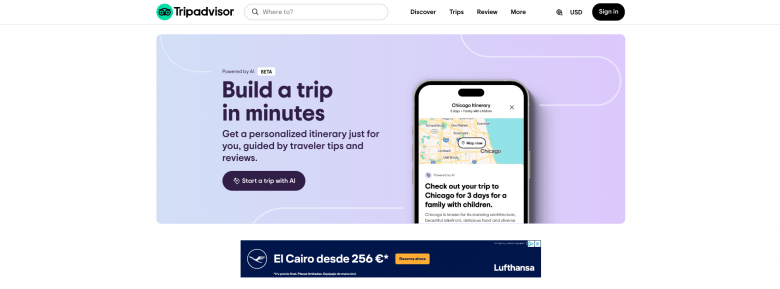
The biggest online travel advisor and another top alternative to Airbnb, TripAdvisor is a prominent company known for providing ratings and feedback about the travel industry, accommodations, activities, and entertainment options. It’s no surprise that this trusted brand is also a successful OTA providing hotels, vacation rentals, things to do, restaurants, travel forums, flights, cruises, and more.
TripAdvisor helps 463 million travelers each month and has a billion reviews. There are 830,000 vacation rental listings on TripAdvisor, which currently operates in 50 countries and in 28 different languages. When you list your vacation rental on the website, it automatically gets translated to each language, taking your listing international.
Airbnb vs. TripAdvisor: How do they compare?
Similar to Booking.com and Expedia, TripAdvisor is a true OTA compared to a vacation rental marketplace. So, if you list your short-term rental on TripAdvisor, then you are competing with hotels instead of just with other rentals like on Airbnb. However, TripAdvisor has a vacation rentals tab directly on the homepage menu, so vacation rentals are still highly visible.
Because TripAdvisor owns other vacation rental brands, such as FlipKey, when you list on TripAdvisor, your listing gets automatically published on their other brand pages. Airbnb does not have this type of independent website under its control, so when you list on Airbnb, your property will only be listed on Airbnb.
Both of these websites have distinctive badges that they award hosts to reward outstanding services or accommodations. These badges are equally recognizable throughout the community as being prestigious awards that set your listing apart.
Plum Guide
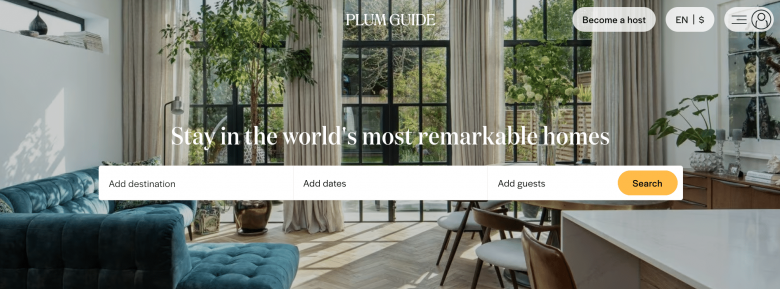
Plum Guide is a relatively new luxury vacation rental website that launched in 2015. Recently it’s been generating talk within the vacation rental industry because of its growing popularity.
Plum Guide is a small but quickly growing business, with 30,000 listings spanning 30 countries. This small number of listings may be intentional to garner a sense of exclusivity to the website.
To list on Plum Guide, hosts must pass a rigorous Plum Test. This test uses an algorithm and physical visits by hospitality experts to assess if your property is luxurious enough to join.
Airbnb vs. Plum Guide: How do they compare?
These two sites compete within the same market. However, Plum Guide goes more niche by only targeting travelers who want a luxury experience instead of a general audience.
Airbnb does not have many restrictions when it comes to listing your property, so it is fairly open to all. Plum Guide, on the other hand, only allows the top 1% of homes onto its books. In fact, only 3% of houses that apply for Plum Guide even make it past the Plum Test. Plum Guide curates the houses that it has listed, and Airbnb leaves it up to the user to curate their trip as desired.
Plum Guide poses a threat to the luxury locations and users on Airbnb. If Plum Guide gains enough traction, it may be able to steal those customers away and become an even more formidable competitor to Airbnb.
Homes & Villas by Marriott
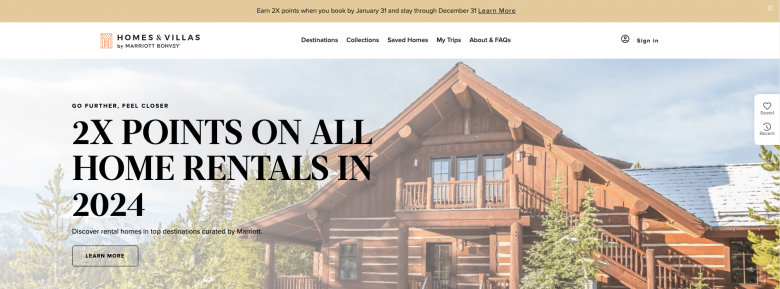
The vacation rental trend is expanding its reach into the hotel industry, with hospitality firms finding innovative ways to blend the two. Marriott, for instance, seized upon this opportunity by launching Homes & Villas as part of its broader Marriott International portfolio.
One of the standout features of this platform is its capability to tap into hotel-centric traffic for additional monetization. Now, loyal patrons of Marriott and the broader hospitality sector need not look elsewhere, as they can seamlessly reserve private accommodations with a brand they already trust. Moreover, Marriott offers the added perk of allowing guests to utilize their Marriott points for bookings on their vacation rental platform. It’s a win-win!
Airbnb vs. Marriott Homes & Villas: How do they compare?
The ability of Homes & Villas to tap into Marriott’s 140 million+ global customers certainly gives it a competitive edge. What’s more, Homes & Villas only advertises premium and luxury private homes, potentially stealing customers from Airbnb Luxe.
Nevertheless, the fact that Homes & Villas only works directly with property management companies (no independent hosts) means that the target audience for these two companies differs. For individuals looking to break into the vacation rental industry, Airbnb will still be the obvious choice.
FlipKey
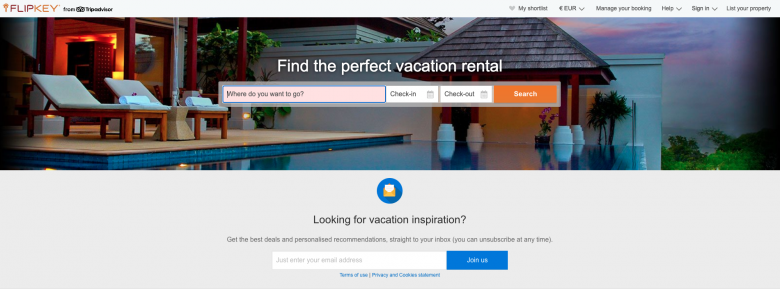
FlipKey is a subsidiary of TripAdvisor. It got its start in 2007 as a house-swapping platform, and TripAdvisor acquired it the following year. It now focuses solely on vacation rentals.
Today, FlipKey has more than 830,000 listings in over 190 countries worldwide. Backed by TripAdvisor, you can see ratings from its parent company directly on the listing when browsing. (A good reminder of how important it is to get ratings and reviews from guests!)
Airbnb vs. FlipKey: How do they compare?
Both Airbnb and FlipKey focus primarily on vacation rentals. While on Airbnb, you can book a room or house to share, FlipKey only offers whole accommodations. Both websites offer great housing options that range across terrains and have filters to better find your dream vacation rental.
Additionally, FlipKey has access to a wider audience than Airbnb due to its connection to TripAdvisor. This makes their target audiences slightly different as well. If someone is looking for help planning their entire vacation, they will more likely land on FlipKey and TripAdvisor than on Airbnb.
9flats
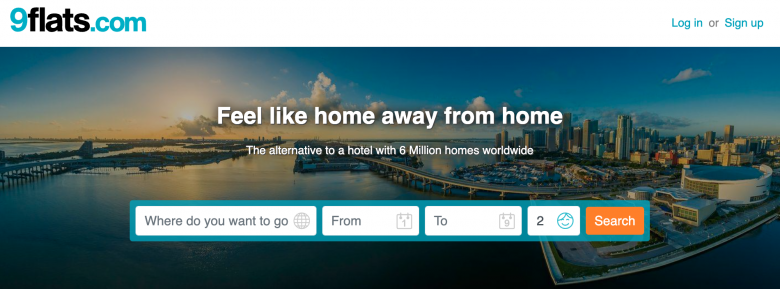
Founded in 2010, 9flats is a smaller competitor of Airbnb, but you shouldn’t overlook it. It has more than 6,000,000 accommodations listed in more than 100 countries. It provides short-term rentals for rent or lease.
Airbnb vs. 9flats: How do they compare?
9flats is another site like Airbnb that works similarly with filtering for available dates. Additionally, accommodations for both range from apartments to more niche options like igloos or tree houses.
It’s important to note that Airbnb advertises itself as a vacation rental website, whereas 9flats claims to be a short-term rental platform. This difference may seem trivial, but it means 9flats also wants to attract non-vacation-specific renters, which shows with their leasing option.
Airbnb has made its footprint around the world, even though it is based in the U.S. Airbnb has a stronghold in the U.S., whereas 9flats is based in Europe and is working on setting up its brand there.
Airbnb competitor FAQs
Is there something else other than Airbnb?
Yes! Airbnb may have become the household name for vacation rentals, but there are numerous other Airbnb-like sites that offer similar services. Some options include Vrbo, Booking.com, Expedia, and TripAdvisor.
Who is the biggest competitor to Airbnb?
Vrbo is commonly considered the biggest Airbnb competitor. It has over 2 million listings and vacation rentals in 190 countries. And because Vrbo is part of the parent brand Expedia Group, listing on Vrbo enables you to tap into this brand’s 112+ million monthly unique visitors.
Is Airbnb an oversaturated market?
The Airbnb market has grown considerably over recent years. However, it’s not considered an oversaturated market because there’s still opportunity to succeed as an Airbnb host. Of course, market saturation varies by state and city.
Takeaways: finding the best Airbnb alternative sites
Airbnb is one of the top listing sites for short-term rentals out there. It has the highest number of vacation rentals of any site and hundreds of millions of active users. However, Airbnb does not have a monopoly over the vacation rental industry. There are many other websites competing with Airbnb that offer accommodations and more.
As a short-term rental owner, it’s important to know and explore Airbnb alternatives to make sure your property appears on the right websites to reach your business goals. If you want to reach a wider audience, join Expedia. If you want another website that specializes in vacation rentals, join Vrbo. If you have a luxury property, join Plum Guide.
Whichever Airbnb alternative you pick, you won’t go wrong. Our advice? Be present in as many channels as you can! And no worries, this doesn’t need to be a Herculean task. You can easily sync all your bookings and calendars in one centralized dashboard using a vacation rental channel manager. Not only will it help you avoid jumping from channel to channel to manage reservations and reply to guest inquiries, but it will also prevent you from getting double bookings.
Don’t see the form to download our Airbnb rental agreement? Click here.